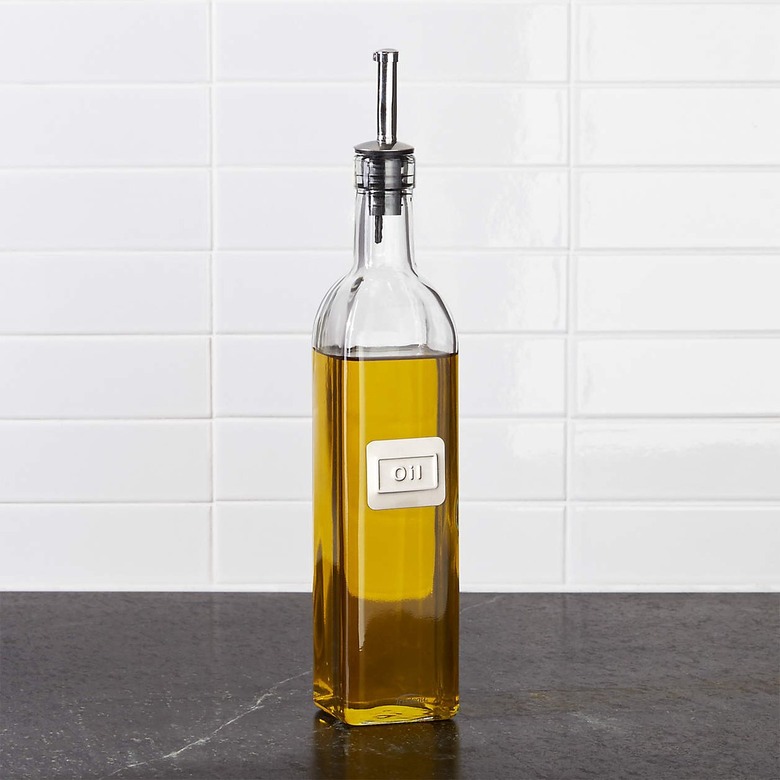You've Been Storing Your Olive Oil All Wrong
When it comes to versatile kitchen staples, olive oil is at the top of the list. After all, it can be drizzled onto bread, whisked into dressing, or used to fry eggs — and that's just scratching the surface. The oil also offers a delightful fresh and peppery flavor, along with myriad good-for-you nutrients.
However, if olive oil isn't stored correctly, these features can take a turn for the worse. "Olive oil is sensitive to light, heat, and oxygen," explains Olivia Roszkowski, chef-instructor at the Institute of Culinary Education. This is due to its chemical makeup and rich nutrient content, she adds. Specifically, when these components are exposed to light, heat, or oxygen, they degrade and break down, ultimately spoiling the oil.
So, what's the right way to store olive oil, exactly? Read on to learn about the best practices for olive oil storage, plus signs that your oil has gone bad.
Where to store olive oil:
The best place to store olive oil is one that limits exposure to light, heat, and oxygen. This means the area should be enclosed, dark, and cool, explains Roszkowski, like a kitchen cabinet or the pantry. On that note, you'll want to think twice about keeping olive oil in a cabinet near the stovetop. Sure, it's a convenient spot, but the stove releases heat — one of the main enemies of olive oil.
At this point, you might wonder if the refrigerator is fair game. Besides, isn't the refrigerator enclosed, (usually) dark, and cool? While this is true, refrigerating olive oil isn't necessary if you regularly use it. Doing so will solidify the olive oil, "making it nearly impossible to pour from [the] bottle," says Roszkowski. Plus, according to the Academy of Nutrition and Dietetics, olive oil tastes best at room temperature (65 to 75 degrees Fahrenheit), making a cabinet or pantry the way to go.
Best olive oil storage containers:
Typically, manufacturers package olive oil in a way that helps maintain its freshness. This involves packing the oil in dark or opaque containers, says Roszkowski, which will protect it from light exposure. That being said, if you buy olive oil in a dark or opaque container, be sure to keep it in there. Such containers can help improve the storage life of your olive oil, as noted by a 2018 research article.
But what if your olive oil was packed in a clear bottle? You can still protect it from light exposure by storing it in a dark kitchen cabinet, says Roszkowski. As mentioned above, most manufacturers pack olive oil in dark containers, but some brands may pack olive oil in clear vessels.
If you choose to transfer your olive oil into a different container, don't forget to consider the material. "Containers that are poor conductors of heat will help preserve the oil," explains Roszkowski. This includes glass and plastic, which are often used for olive oil packaging. Avoid storing the oil in permeable materials, like untreated clay or wood. Finally, "make sure the container is food grade to make sure nothing [leaches] into the oil," adds Roszkowski.
Olive oil shelf life:
Once opened, a bottle of olive oil should be used within six months, shares Roszkowski. However, extra-virgin olive oil — which is less processed than other types of olive oil — usually has a shorter shelf life, so you'll want to use it even sooner, she notes. In either case, "try to purchase olive oil from a retailer where the oil has not been sitting on the shelf for months," says Roszkowski. You can do this by buying olive oil from a smaller grocery store or specialty market, where the products are replenished more often.
Signs olive oil has gone bad:
By following the best practices for storing olive oil, you can protect your precious oil and prevent it from spoiling. But how do you know it's gone bad? "The main way to know is by using your senses," explains Roszkowski. Good olive oil should smell fresh and bright, with slight peppery or fruity notes. In contrast, "if the oil is rancid, the smell will be less fragrant with olive undertones," says Roszkowski. It might even smell like an artificial material, like plastic, crayons, or metal, she adds.
In terms of flavor, good olive oil should taste fresh and somewhat peppery. On the other hand, "rancid oil will be more likely to taste sour, bitter, [and] less fruity," says Roszkowski. The oil may also leave a greasy, slick sensation in your mouth. If so, toss the olive oil and get a new bottle, then follow the tips above to ensure it stays fresh.
